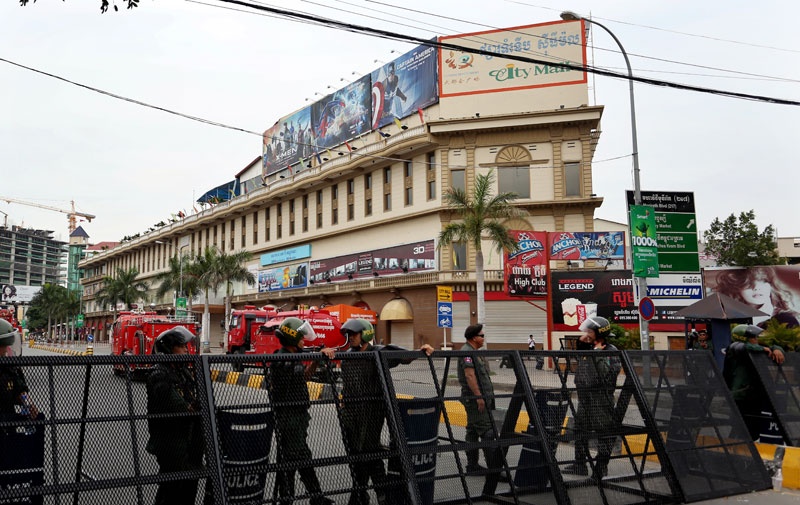Hundreds of demonstrators regularly gather outside the Phnom Penh courthouse when high-profile cases are being tried, but Phy Mengleng, the manager of an electronics store across the street from the court, wishes they would just go away.
“On a good day without protests, we can earn between $2,000 and $4,000 per day,” he said in an interview last week. “But when there is a protest we lose that money.”

As demonstrators on Tuesday shouted, cheered and sang to show their support for the unionists and workers on trial for their alleged part in violent protests in November and January, the four-story City Mall was shuttered, a scene that has become commonplace.
Mr. Mengleng, who oversees electronics retailer K-Four inside the mall, said City Mall’s frequent closures ahead of high-profile court cases, when Monireth Boulevard is blocked by protesters and police barricades, has cost the company thousands.
Ny Jing, who owns a small clothing shop in the mall, complained that City Mall, whose representatives would not comment for this story, has made no effort to compensate businesses for the unexpected closures.
“Due to the protests, we have lost about $100 to $200 per day, and City Mall does not give us any discount on the rental fee when we face such difficulties,” she said. “We are not happy with how our business has been affected.”
In Freedom Park, which was home to massive opposition demonstrations between July and January, and has more recently been locked down and occupied by police as the CNRP has restarted rallies in Phnom Penh, the drag on businesses has been even more severe.
Gerry Sun, owner of King Guesthouse on Street 110, which is situated near the park, said that he was forced to shut the guesthouse for good in April after 10 years of operation, following heavy financial losses that amounted to $50,000.
“We lost $50,000 from 2013 to 2014 because of the political problems almost every day last year. Customers saw the sight of crowds and police from the top floor and just checked out the next day. I had to close and I have no money to open again. I lost it all,” he said.
National Police spokesman Kirth Chantharith said Tuesday’s police barricade and similar measures are necessary to maintain the law and order that would allow businesses to thrive.
“The law allows the people of any political party to demonstrate, but they have to ask for permission. But they never listen to authority so in order to keep law and order we have to block the road,” he said. “Of course we don’t want to, but otherwise the situation will become more unstable and affect even more businesses.”
For some businesses near the municipal court, however, a protest has its upsides.
The Tela Mart on the corner of Jawarhalal Nehru and Sihanouk boulevards has seen a 10 to 20 percent drop in sales because the flow of traffic on Monireth Boulevard is frequently cut off by police barricades, but the Total gas station about 50 meters away on Sihanouk Boulevard, unimpeded by barricades, is bustling with customers as sales increase by about 60 percent to $600 on protest days.
Sun Khema, a cashier at the Total garage, said, “On protest days our sale increases about 50 percent for general products, including gasoline. Normally, we make sales of about $200 per day from early morning to about 6 p.m., but on protest days, it goes up to around $500 to $600 during the same time.”
For food vendor Uy Sokchetra, who was shoveling the last few handfuls of spicy river clams in a bag for a customer who had spent Tuesday morning demonstrating, a protest is a great opportunity to make a quick buck.
Usually it takes him an entire day to sell all his mollusks, he said, but at the protest he can clear his cart in about three hours.
“Normally I earn about $15 to $18 per day, but during protests I can sell everything in less time and earn between $23 to $25,” he said.
Kao Srors, 36, who was selling steamed corn on the cob near the municipal court, agreed that protests provided some of her best business.
“Sales on protesting days are faster,” she said. “The businesses [around the court] are very rich, so if they lose money I don’t care.”




